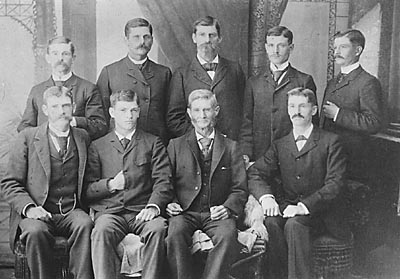Apple Royalty
Berkeley County's Miller Family
Text and photographs by Carl E. Feather

This formal portrait shows W.S. Miller and his sons. Seated are, from left, Gold, Porter, W.S., and Edward; standing are Will, John M., Charles, Harry and Gilbert Miller. Date and photographer unknown.
First came the soil: limestone to supply nutrients to the trees and a clay base to hold the moisture. Fruit borne of this soil is given plenty of time to ripen thanks to the extended frost-free growing periods of this region. A gentle, rolling topography makes for relatively easy cultivation and harvest. Finally, the orchards are close to major Eastern markets. It is no coincidence that 95 percent of the 143 million pounds of apples produced in West Virginia on average per year are grown in Berkeley, Hampshire, Jefferson, and Morgan counties.
These conditions, however, are equally favorable for growing grapes for wine. That's where Providence, in the form of a righteous Presbyterian woman, once again comes into play. The winemaker was William Smith "W.S." Miller; the righteous woman his wife Isabella Wilson McKown Miller. The Millers were farmers with a large family that eventually included eight sons and three daughters. In the early 1850's, the couple lived on a 200-acre farm, "Prairie Dingle," two miles north of Gerrardstown in southern Berkeley County. While the land could provide W.S. and his family with plenty of food to eat, he desired a cash return from his land. He tinkered with a small orchard and vineyard - plums, peaches, and grapes - and was encouraged by his initial success. The vineyard seemed most promising. The wine W.S. produced found favor with both vintners and saloon owners who described it as being fine as any Rhine wine.
His neighbors enjoyed the wine, as well. While coming home from church on a Sunday afternoon, Isabella spotted one of the neighbor's boys along the road, intoxicated from her husband's wine. When she arrived at the farm, Isabella challenged her husband's errant ways. She said, in so many words, "William, we cannot be responsible for making drunkards of our neighbors. You can either get rid of the wine press, or I go." The following spring, the grapevines were removed and replaced with peach trees.
That story is one of many told by Madge S. Miller, an Inwood resident and the widow of W.S. Miller's grandson, John M. Miller II. Although Madge married into the Miller family, she has become its official historian.
The Millers are part of an apple dynasty that extends throughout the Eastern Panhandle and has influenced planting in Virginia's northern Shenandoah Valley, as well. W.S. Miller was unofficially dubbed the "Father of the Apple Industry," and his son John McKown Miller given the moniker of the "Apple King."
You can read the rest of this article in the Fall 2001 issue of Goldenseal, available in bookstores, libraries or direct from Goldenseal.